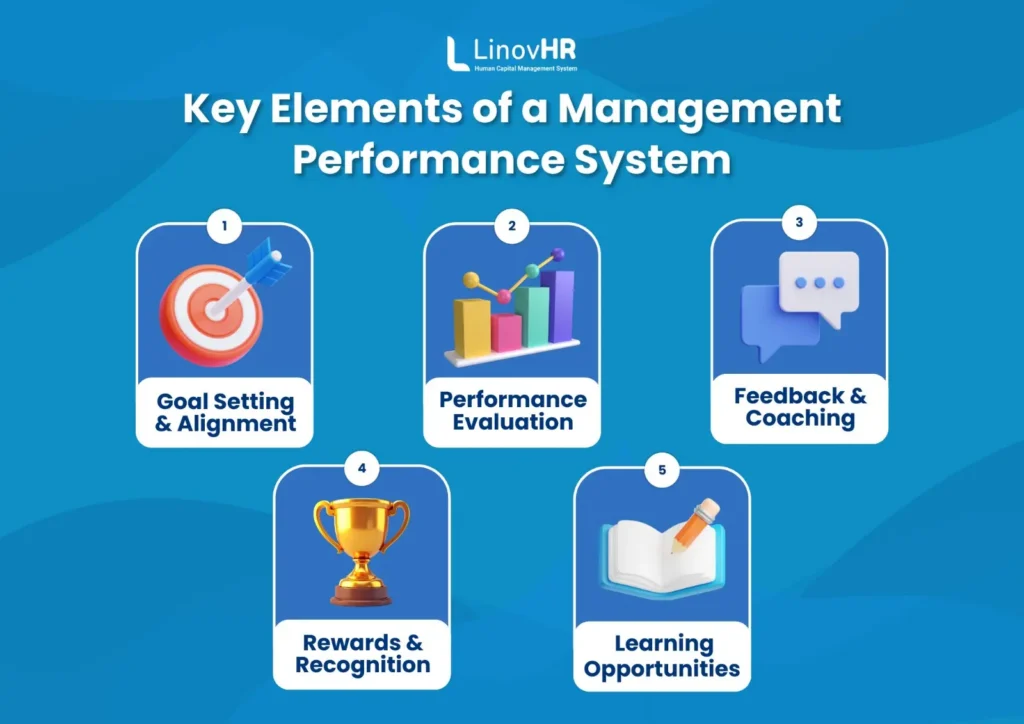In today’s competitive business environment, managing employee performance effectively is key to sustaining organizational success.
A management performance system provides companies with a structured and data-driven approach to evaluate, develop, and align their workforce with business objectives.
By integrating technology and strategic HR practices, this system helps organizations not only track progress but also enhance employee engagement, motivation, and productivity.
In this article, we will explore what a management performance system is, how it can be effectively implemented, and the key elements that make it successful in supporting your organization in optimizing management performance systems across the board.
What Is a Management Performance System and Why Does It Matter?
A management performance system is a structured process that enables organizations to align employee goals with business objectives while continuously evaluating and improving performance.
It provides a framework where managers and employees collaborate to set measurable targets, monitor progress, and provide constructive feedback.
This system not only supports accountability but also fosters a performance-driven culture where every individual contributes directly to the company’s success.
In today’s fast-changing business environment, having an effective management performance system is crucial for maintaining competitiveness.
It allows HR professionals and business leaders to track productivity, identify skill gaps, and make data-driven decisions about workforce development.
Without a well-structured system, organizations risk inconsistent evaluations, low employee engagement, and unclear expectations factors that can hinder growth and employee retention.
In the context of Indonesia’s growing digital transformation, many companies are adopting automated management performance systems to enhance transparency and efficiency. With technology-enabled solutions, performance tracking and reporting become more objective and accessible.
This approach helps HR professionals focus more on employee development rather than administrative tasks, ensuring management performance contributes strategically to business outcomes.
Also read: Talent Management vs Performance Management: Which Drives Business Success?
Implementation of Management Performance System
Implementing a management performance system requires strategic planning and the right tools. It’s not just about technology but about building a process that integrates performance management with organizational culture and leadership vision.
1. Set Clear and Measurable Goals
The first step in implementing a management performance system is defining clear objectives that align with the company’s vision.
Each goal should be measurable, realistic, and time-bound to help employees understand expectations and track their own progress.
When goals are aligned across departments, it becomes easier to evaluate performance fairly and consistently.
2. Establish a Continuous Feedback Process
A successful management performance system relies heavily on ongoing feedback. Regular check-ins allow managers to identify challenges early and support employees in improving their performance.
This approach encourages open communication and helps create a culture of trust within the workplace. Feedback should not only focus on shortcomings but also on recognizing strengths and celebrating milestones.
3. Utilize the Right HR Technology
Modern organizations benefit from using integrated HR software to streamline their management performance system.
Digital tools make it easier to track employee performance data, automate goal-setting, and generate insightful reports for management decisions.
Selecting an HR solution that offers flexibility, scalability, and user-friendly features ensures smoother adoption across the company.
Key Elements of a Management Performance System

A management performance system works effectively when built on solid components. These key elements ensure that performance management becomes an ongoing process rather than a once-a-year evaluation.
1. Goal Setting and Alignment
Effective performance management starts with setting clear, achievable goals that align with organizational strategy.
This ensures every employee understands their role in contributing to company success. Regularly reviewing and updating these goals helps maintain relevance and adapt to changing priorities.
2. Performance Measurement and Evaluation
To manage performance effectively, companies must have reliable methods of assessing employee output. A management performance system typically uses key performance indicators or KPIs and measurable outcomes to evaluate effectiveness and productivity.
Objective evaluation helps managers provide constructive feedback and identify opportunities for training and career development. It also ensures fairness and reduces bias during the assessment process.
3. Feedback and Coaching
Continuous feedback is a vital part of any management performance system. Managers should provide guidance and support to help employees overcome challenges and grow professionally.
Regular coaching sessions help build confidence, improve skills, and foster stronger relationships between leaders and their teams.
4. Rewards and Recognition
Recognizing achievements motivates employees to perform better. A strong management performance system includes mechanisms for acknowledging success, whether through promotions, bonuses, or public recognition.
Rewarding top performers encourages a competitive yet healthy work environment, driving individuals and teams to continuously strive for excellence.
5. Learning and Development Opportunities
Performance management should go hand in hand with employee development. Offering training programs, mentorship, and upskilling opportunities ensures employees are equipped to meet evolving business needs.
An effective management performance system identifies skill gaps and provides tailored learning solutions, enhancing both personal and organizational growth.
Grow with LinovHR Management Performance System
Building an effective management performance system requires more than just defining goals and measuring results. It demands an integrated solution that simplifies HR workflows while providing data-driven insights into employee performance.
LinovHR’s Management Performance System offers a comprehensive platform that supports performance tracking, goal alignment, competency assessment, and continuous feedback all in one integrated HRIS ecosystem.
Request a free demo now! Discover how LinovHR Management Performance System can transform your approach to employee performance today.






